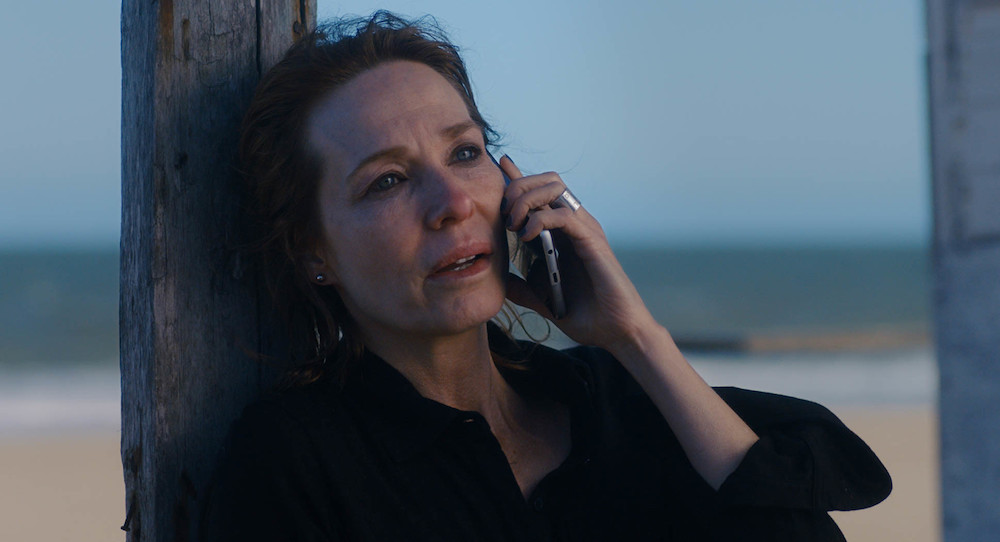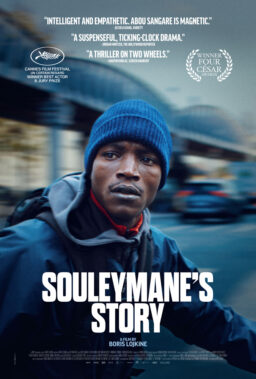In Verónica Chen’s Argentinian film “High Tide,” a woman does what she wants with her body, and then has to put up with leering men and their disgusting lack of boundaries. Laura (Gloria Carrá) decides that she does indeed want to have sex with Weissman (Jorge Sesán), the boss of the workers who are fixing up a BBQ area for her beachside, two-story, glass-covered home. Weissman is a total dill weed from the get-go, the way he says gross stuff when dancing up against her, the stuff that a person with respect for women would never say. But Laura brushes it off, and the next morning when Weissman leaves, his workers are hiding the woods, are smiling like excited little boys, or sharks.
Weissman doesn’t come back the next day, but the workers know what happened, and they are even more predatory. One worker in particular, Toto (Cristian Salguero) always finds a way to make a suggestive remark about sex when Laura communicates with them, and later gets naked on her property in front of her. He’s constantly staring at her with a grin, and also freely using her home when she is gone, despite her telling them not to use the bathroom. Chen gives his predatory a gaze a couple of jarring close-ups, but the story has little interest in him aside from the chaos he can stir up, like the houseguests in Darren Aronofsky’s “mother!”
The psychological game of “High Tide” is meant to come from Laura choosing to ultimately put up with such grotesque disrespect—and not give them the satisfaction of showing they’ve gotten to her—even though it’s all driving her mad. But Chen struggles to escalate the tension her story relies on, even as the workers’ behavior is more flagrant, their behavior more inappropriate. As if to provide context, certain sequences are meant to feel like we’re in a horror movie—like an overhead shot that shows the two workers breaking into her home as she goes to the beach—but these images don’t lead anywhere. Instead the film becomes repetitive, as in, “Here’s another instance in which the workers are doing something gross and disrespectful, and Laura tolerates them as if they were her wily, perverted sons.” Carra’s performance bottles up all this aggravation, but the story is so tedious that it’s hard to connect with her like you did the first act. Eventually the scenario that Chen is conjuring snaps when you start thinking, “She’s putting up with all of this for a BBQ pit?”
By the third act, the film becomes as aggravating as the workers’ blatant creepiness, in a way it does not intend to be. One’s hope that this film would comment on its ugly class optics are lost—the workers are simply written as one-dimensional villains with thick accents who refuse to follow the upper-middle class woman’s guidelines. With such a simple story that is dragged along by Laura’s decisions and select actions, a real-life context is meant to support “High Tide” through out. But its premise, execution, and even setting register as a clumsy way to depict an everyday horror experienced by countless women.

Also in the festival’s World Cinema Dramatic section, Mexican filmmaker Rodrigo Ruiz Patterson’s “Summer White” is about a boy named Rodrigo (Adrián Rossi) who loves his mama (Sophie Alexander-Katz) to a dangerous level. The two are very close, like laying-in-bed-together, brushing-teeth-together-almost-nude close. When she teaches him how to slow dance minutes later into the movie, there is a tension between them as they stand inches from each other that seems loaded. But, then an older man Fernando (Fabián Corres) enters the home, a friend of mom’s who sticks around. Rodrigo, friendless and often silent, struggles to adjust. Rodrigo escapes to an abandoned RV in a junk yard, and proceeds to build his own type of domestic situation there; his interest in smashing up the place converting to finding a sense of home.
Challenging the way that you might think about a new guy in mom’s life, Fernando is not a bad guy—they go on a trip to Acapulco, and when Fernando playfully shoves Rodrigo into the pool, it’s not a cause for war, but play. Fernando wants to help connect with Rodrigo through the boy’s clear interest in driving. But that becomes contentious, as with a few scenes that show disastrous driving lessons. Even worse, whenever Rodrigo hears sounds of Fernando and his mother being affectionate, or having sex, Rodrigo acts out. His interest in setting things on fire grows, starting with burning stuff in the lot, and then eventually, testing what it would feel like to put gasoline on his hands.
The performances in “Summer White” are good enough that you wish they had more to do, other than try to capture a low-simmer coming-of-angst tale about a mama’s boy who has to share. In displaying its very low-key instances of conflict, Patterson’s filmmaking can be obvious, as with a moment in which the sound mix cuts everything out except Rodrigo’s heavy breathing so that we can hear him as he pours paint on Fernando’s suit. Later, Fernando points out Rodrigo’s heavy breathing when they’re in the car, and it feels like the script working overtime to assert a detail we should recognize primarily from performance.
“Summer White” can feel empty too, going back and forth between Rodrigo and his RV, as we watch this young man and hope to feel something from a script that’s clearly personal (as the co-writer/director and the character share a first name). Rodrigo’s every sense of being is upset, and yet the movie seems thwarted by his angst—unable to make a compelling character study out of a boy’s inability to communicate beyond some heavy breathing, clenched fists, and pyromania.












